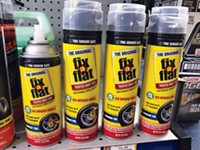Advertisement
Grab your lab coat. Let's get started
Welcome!
Welcome!
Create an account below to get 6 C&EN articles per month, receive newsletters and more - all free.
It seems this is your first time logging in online. Please enter the following information to continue.
As an ACS member you automatically get access to this site. All we need is few more details to create your reading experience.
Not you? Sign in with a different account.
Not you? Sign in with a different account.
ERROR 1
ERROR 1
ERROR 2
ERROR 2
ERROR 2
ERROR 2
ERROR 2
Password and Confirm password must match.
If you have an ACS member number, please enter it here so we can link this account to your membership. (optional)
ERROR 2
ACS values your privacy. By submitting your information, you are gaining access to C&EN and subscribing to our weekly newsletter. We use the information you provide to make your reading experience better, and we will never sell your data to third party members.
Greenhouse Gases
HFC smuggling undermines climate efforts
More enforcement at borders could deter illicit trade
by Cheryl Hogue
November 11, 2021

Smugglers are finding a profitable market in synthetic refrigerants that are highly potent greenhouse gases.
By land and sea, they are shipping marked, unmarked, and mis-marked containers of hydrofluorocarbons (HFCs). Authorities in the European Union, which began a phaseout of HFCs in 2015, seized hundreds of metric tons of illicit HFCs in 2019 and 2020, according to figures from the European Chemical Industry Council . This illicit trade spans the globe, according to the United Nations Environment Programme.
Because most HFCs are hundreds of thousands of times more potent at warming the planet per molecule than CO2, countries are discussing how to curtail illicit HFC trade as part of climate change talks, including the global COP26 conference in Glasgow this week.
“Illegal trade undermines the climate benefits that we’re all trying to achieve,” US Environmental Protection Agency administrator Michael Regan said at a discussion he chaired in Glasgow. “It also disadvantages law-abiding companies that are seeking to comply with the requirements and that are making investments in producing substitutes for HFCs.”
The European Union was the first part of the world to start eliminating HFCs, said Anthony Agotha, senior diplomatic expert on the staff of Frans Timmermans, the European Commission executive vice president for the European Green Deal. As a result, prices for HFCs in the EU increased compared to elsewhere in the world, creating incentive for illegal trade in these substances.
Organized criminal entities “could be trafficking in something else, but they choose climate super-pollutants” over other items, such as illicit drugs, because of profitability, said Alexander von Bismarck, executive director of the Environmental Investigation Agency, a nonprofit group that probes and exposes environmental crime worldwide
A similar situation happened when the US ratcheted down its production of ozone-depleting chlorofluorocarbons (CFCs) in the 1990s, von Bismarck said. Border agents began to find canisters of CFC-12 (also known as R-12) in the small, fast boats that drug runners used to sneak shipments of cocaine into the US. “What was found is that the risk-adjusted return was better for smugglers from R-12 than it was from cocaine,” simply because enforcement agencies didn’t place much importance on refrigerants, von Bismarck said. Then, border enforcement officers in Florida began to seek out refrigerants as well as drugs. “That had an enormous impact on the climate” by keeping CFCs, which are also greenhouse gases, off the market, he said. Eventually, HFCs replaced CFCs in many applications.
Today, the illicit HFC market in the EU is hurting companies, including US businesses, that manufacture HFC alternatives such as hydrofluoroolefins, which have much lower global warming potentials (GWPs) than HFCs, said Kevin Fay, executive director of the Alliance for Responsible Atmospheric Policy, a coalition of US manufacturers, businesses and trade associations which make or use fluorinated gases for the global market.
“Producers who’ve invested billions of dollars in low-GWP, next-generation technologies are losing tens of millions, if not hundreds of millions of dollars a year right now, just in losses in the EU market because of illegal trade,” Fay said. The phasedown of HFCs is a market mechanism designed to encourage the transition to new technologies, a process that smuggling weakens, Fay pointed out.
The scheme the world uses to switch from one set of refrigerants to the next, such as from CFCs to HFCs and now from HFCs to hydrofluoroolefins and other substances, creates an opportunity for illegal trade, von Bismarck said. Under the Montreal Protocol on Substances that Deplete the Ozone Layer, industrialized countries such as Canada, Japan, the US, and members of the EU reduce their production first while developing countries are allowed to continue manufacturing for additional years.
This approach isn’t misguided, von Bismark said. Instead, he added, it requires greater enforcement to ensure that it works as intended.
The EPA’s Regan pointed out that the US plan to limit HFCs, announced in September, includes beefed-up enforcement against illegal imports of these chemicals. It also requires containers of HFCs to carry quick-response codes so they can be tracked from sales through distribution. In addition, those cylinders of refrigerant must be refillable, Regan said, noting that illegal imports are often packaged in disposable cylinders that can’t be refilled.
The European Commission plans to update its HFC regulations in early 2022 to strengthen its customs enforcement requirements, Agotha said.
Yet, management of HFCs shouldn’t solely focus on the borders of countries ramping down their use of these substances, said Yutaka Shoda, vice-minister for global environmental affairs for Japan’s Ministry of the Environment. Preventing leaks of these gases, recovering them from old equipment, and disposing of HFCs safely are also essential worldwide, he said.
Demonstration of effective collection and destruction of HFCs, including illicit shipments, could become a powerful tool for combating climate change, von Bismarck said. “These are climate bombs that you can find and actually diffuse on the spot.”





Join the conversation
Contact the reporter
Submit a Letter to the Editor for publication
Engage with us on Twitter